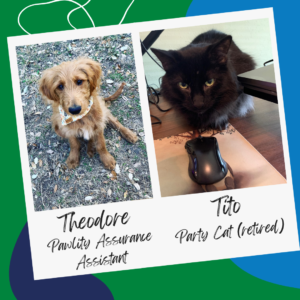What’s new at Inera and around the industry
March 2022 Newsletter
eXtyles Build 5000
Bust out your celebratory noisemakers, because on March 8 we reached a great big milestone in eXtyles development: eXtyles Build 5000! That means our automated overnight build process has put together a full release of eXtyles more than 5000 times since 1999.
 If you’re wondering what an eXtyles build is, wonder no more: check out our blog post “What is an eXtyles build, anyway?” (published in celebration of eXtyles Build 4000).
If you’re wondering what an eXtyles build is, wonder no more: check out our blog post “What is an eXtyles build, anyway?” (published in celebration of eXtyles Build 4000).
You can always find your current eXtyles build number via eXtyles>About in Word. It’s likely a number between 4700 and 5050, depending on when you received your last eXtyles update. If it’s lower than 4700, please contact your eXtyles Administrator or our Support team, because that may mean you don’t have the latest update installed!
Edifix API 2.0
Regular readers know Edifix as our cloud-based reference processing solution, helping users ensure accuracy, provide links to cited sources, meet style requirements, save time, access information about retracted publications and—via our partnership with Cabells—identify articles that appear in potentially predatory journals.
Did you know that Edifix can also be integrated with other platforms via our Edifix API? Recently our Edifix development team released Edifix API 2.0, with some key improvements including higher processing volumes, the ability to “drop off” jobs, and better authentication management!
For all the details on Edifix API 2.0, check out our press release on Edifix.com.
People of Inera: Christine Benson
This new feature will introduce you to newer Inera team members and help you get to know not-so-new team members better.
Our Quality Assurance Specialist, Christine Benson, is one of our newest team members! She joined Inera in October 2021 and is responsible for testing ALL the things, including updates from development and configuration teams and routine customer build updates, as well as reviewing daily test suite results. She makes sure that all the buttons, bells, and whistles work properly before shipping anything out to you! In this month’s newsletter, Christine answers some questions to help you get to know her a little better.
Q: What’s your favorite thing about your job at Inera?
I am a huge fan of puzzles. I love it when I have a puzzle that needs to be solved. And sometimes these tests present me with a puzzle: “Why isn’t this working? What can I do to make it work? What sort of things can I put together to make this work?” Then I send all that information back to the developers to help them fix whatever isn’t working. Just the fact that I get to solve puzzles all day is exactly what I wanted in a job.
Q: Tell us about your pets!
I have a 12- or 13-year-old black cat named Tito. I adopted him in 2014 from the guitarist for the band Neon Indian. He was known as the “party cat” because whenever we would have a gathering, people would just line up to pet this amazing cat.
I also have a goldendoodle puppy named Theodore, who is almost 5 months old. We’ve been going to puppy classes, so he knows how to “sit,” how to “down,” and how to come when he’s called; he just chooses not to.
Q: What are 3 fun facts about you?
- I’m really good at Magic: The Gathering, which is a nerdy card game that I started playing as an adult to help a friend feel better and ended up really liking. So I started going to tournaments. The last one I went to, I came in 67th out of 1300 people, and I was the second-highest-finishing female player. Then at another tournament, I came in 40th out of 2000; it was crazy.
- I’m really really into stationery. I’m a member of a stationery club, so I get all of these little special stationery items—calendars, notepads, notebooks, letters, pens. I have a thousand pens.
- In college I traveled to Moscow, Russia, for six weeks with my classmates and got to study at a university. But then, when my classmates went home, I took a job in Siberia for another six weeks, teaching English at a language-themed summer camp. It was wild. We basically lived in the forest for six weeks, teaching different international languages, while two other themed camps shared the same camp area.
Q: What superpower would you choose, if you could only have one, and why?
I would want to talk to animals. I love my animals so much, and I would want to actively converse with animals, so that I could talk and understand. I want so badly to know what my animals are thinking. I work with animals on the weekends, like horses and stuff, and I just think it would be so cool to be able to talk with animals.
What we’re reading: Finding the right words, and making them accessible
In “Writing the ‘Right’ Words”, Science Editor columnist Stacy L. Christiansen discusses the challenges of choosing terminology in scientific writing: when there isn’t just one clear, consensus term to use for a concept, how do you decide among the contenders? “Do you talk about hypertension or high blood pressure?” she asks. “Myopia or nearsightedness?” Usually making the best choice depends on knowing your audience—but, as Stacy explains, it’s not always that straightforward!
And then there are words that we just shouldn’t use, no matter the audience. In a guest post on the Scholarly Kitchen blog, astrophysics professor Richard de Grijs explains how “NASA’s announcement [that it planned to retire the use of “potentially offensive” astronomical nicknames], combined with the common use of potentially inappropriate terms in my own discipline … recently led me to reconsider the inclusivity of my own communications.” Richard’s post is an education on both astronomy and astrophysics, on the one hand, and the language used in writing and speaking about it, on the other.
“My key message,” he concludes, “is that we should be mindful of our language at all times. Consider whether any expression used might offend the reader and check if the adopted terminology passes the ‘pub test’.”And speaking of audiences, when it comes to reaching more readers by making your content more accessible, we recommend this Science Editor article by Lorenzo Milani, a user experience specialist at SAGE—and not just because of the baking metaphor. We also recommend this content accessibility resource sheet from our parent company, Atypon!
Find Inera at upcoming conferences
► London Book Fair 2022
London | April 5-7
Inera’s Robin Dunford and Atypon’s Hong Zhou will both be speaking at this year’s London Book Fair.
► CSE 2022 Annual Meeting
Phoenix, AZ | April 30-May 3
► JATS-Con 2022
May 3 & 4
► SSP 2022 Annual Meeting
Chicago | June 1-3
Look for us at the popular Previews session on June 3!
► Balisage: The Markup Conference
August 1-5
If you’d like to be a peer reviewer for Balisage 2022, apply here by March 18!
Attending one of these events? We’d love to see you—please contact us if you’d like to schedule a meeting.
Word Tips: Selecting text with your mouse
ℹ️ Our Word Tips are tested on recent versions of Word for Windows. If you are using Word for Mac, which has a smaller feature set, your mileage may vary.
In last month’s Word Tip, we talked about ways to select text using only your mouse. This month, the keyboard gets its chance to shine! (Note: Some of these tips involve both mouse and keyboard.)
To select a paragraph: Put your cursor at the beginning of the paragraph, then use Ctrl+Shift+down arrow to select.
To select a line: Put your cursor at the beginning of the line, then use Shift+down arrow to select.
To select a sentence: Hold down Ctrl and click your mouse once, anywhere in the sentence. This will select the entire sentence, including the terminal punctuation (period / full stop, exclamation point, or question mark) and the following space:

→ Caveat: If your sentence contains one or more periods used in ways other than terminal punctuation—e.g., in an abbreviation—Word will read the first of those periods as the end of the sentence:

→ Bonus Tip: To delete a whole word at once instead of letter by letter, use Ctrl+Backspace!
Have an intractable Word problem you’d love to solve? Have a clever tip to share? Send it to us at [email protected] (subject line: Word Tips)!